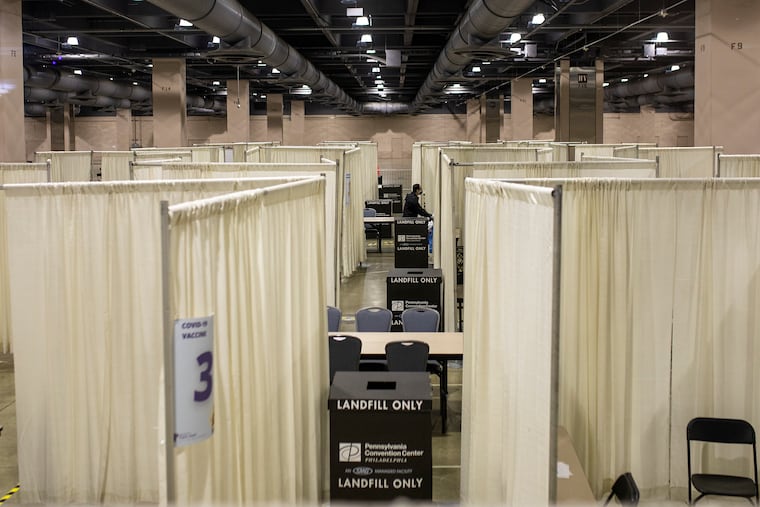City Council proposes new vaccine rollout oversight amid Philly Fighting COVID fiasco: ‘This will never happen again’
The ordinance comes as fallout over the city’s severed ties with Philly Fighting COVID — a self-described group of “college kids” which once oversaw a mass vaccination site — continues to roil.

Philadelphia City Council members Monday presented an ordinance that would impose additional oversight and procedures for awarding contracts and vetting groups looking to provide the coronavirus vaccine.
The proposed ordinance comes after the city severed ties with Philly Fighting COVID — a self-described group of “college kids” that once oversaw the city’s largest mass vaccination site. The fallout continues to roil Philadelphia.
The legislation — slated for introduction later this week — would require the city to have a contractual relationship with vaccine providers in Philadelphia, regardless of any exchange of money. Both Philly Fighting COVID and the Black Doctors COVID-19 Consortium, another group providing vaccines, were previously administering vaccines without city contracts.
No vaccine doses will be available to those without a city contract, and city departments will be not be allowed to award contracts to groups without specifying and evaluating the organization’s experience, the legislation states. City departments will also be required to put in writing what experience qualifies the selected group to deliver vaccines safely.
The proposed safeguards come one week after the city abruptly ended its partnership with Philly Fighting COVID after The Inquirer questioned the city about the group’s privacy policy, which allowed it to sell personal data through a previously undisclosed for-profit arm. The group, helmed by a 22-year-old Drexel graduate student with little medical background, ran a mass vaccination site at the Pennsylvania Convention Center. CEO Andrei Doroshin later confessed to taking several vaccine doses from the Convention Center to administer to his girlfriend and friends.
This legislation, Council President Darrell L. Clarke said during a news conference, would give City Council more oversight in partnerships, like the one with Philly Fighting COVID, to make sure “this will never happen again.”
“We have to make sure that the confidence of the citizens of the city of Philadelphia is in place, and it’s not there now. I’m getting calls from all over about what the heck’s going on,” Clarke said. ”The city of Philadelphia is basically an embarrassment across the country.”
The ordinance would also require departments to specify that the vaccine contract complies with the city’s Economic Opportunity Plan, which ensures that the city supports “minority, women, and disabled-owned businesses.”
The city must also provide council notice before contracting a group to administer vaccines, including information about the organization’s experience and demographics on whom the group intends to inoculate.
The proposed ordinance would also require the health commissioner — or another official named by the mayor — to submit a report every two weeks detailing which groups are permitted to distribute the vaccine, the number of vaccine doses provided to each group, the number of doses administered, demographics of the people vaccinated, and the priority category of those receiving the vaccination.
The legislation is not intended to hinder the vaccination rollout process for groups like the Black Doctors COVID Consortium, council said. Instead, Clarke said, it aims to “establish guidelines.”
» READ MORE: Philadelphia deputy health commissioner resigns following Philly Fighting COVID controversy
Last week, an outraged City Council demanded answers over Philly Fighting COVID, questioning how the group was given the green light to proceed, and comparing the process to city officials’ reluctance last spring to partner with Black Doctors COVID-19 Consortium. Some pointed to the disparity as an example of systemic racism in the city’s contracting process.
Late Saturday, Deputy Health Commissioner Caroline Johnson, who had worked closely with Doroshin, resigned after records obtained by The Inquirer showed she gave him an advantage in a city bidding process by providing a suggested budget number.
The city is now canceling those vaccination clinic proposals and will be issuing a request for new ones, Health Commissioner Thomas Farley said during a news conference Monday. The Office of the Inspector General will conduct an investigation into the relationship between the department and PFC.
“We’re not perfect and we’ve made mistakes that we all deeply regret,” Mayor Jim Kenney said Monday. “But we are committed to doing better and restoring the public’s faith in the city’s ability to get our residents vaccinated.”
The resignation of Johnson, who was leading the department’s vaccine team, comes as the city struggles to inoculate its residents. The Health Department will run its own mass vaccination clinics Wednesday through Saturday this week, and multiple days next week, for people who received their first vaccine through PFC and need a second dose, Farley said.
Councilmember Cindy Bass, the chair of the Public Health and Human Services Committee, called for a Council hearing on Friday on the city’s choice to allow Philly Fighting COVID to provide vaccines. Bass said she attended PFC’s mass vaccination site grand opening in January at the request of the Kenney administration, but she did not know it was run by an outside group.
“At no time in any way, shape, or form … was I ever told or informed that this was an outside entity, that we had a verbal contract with, that was doing these vaccinations with no experience,” Bass said. “These things all came to light afterward.”
Doroshin presented his mass vaccination plans to Bass’ committee during a Nov. 19 informational meeting for council members to hear updates on the city’s vaccine-distribution preparedness. There, no council member pressed Doroshin about his group’s health-care qualifications.